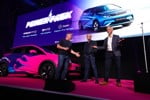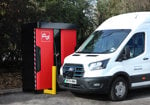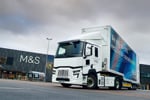Having a fleet policy that combines safety with the environment attempts to marry two conflicting goals. In an apparent catch-22 situation, added safety features traditionally make cars heavier while environmental-friendliness demands lighter cars to produce lower carbon dioxide emissions.
However, both are noble goals and finding a balance between the two challenges has seen the Adult Learning Inspectorate (ALI) develop a fleet policy that could prove to be a blueprint for other Government departments.
ALI employees eligible for a company car must select a vehicle that not only produces CO2 emissions of less than 190g/km but one that has also achieved a minimum three-stars in the European New Car Assessment Programme (Euro NCAP) crash tests.
The Government body operates 117 fleet cars, mainly used by inspectors who each cover between 20,000 and 30,000 miles a year. The inspectors are home-based and the ALI had to seek Cabinet approval before it was allowed to offer them a company car.
Downing Street stipulated that company cars could be provided only to essential users and insisted that they must be environmentally friendly.
In turn, the ALI decided to introduce the emissions level and Euro NCAP criteria. With no full-time fleet manager, the responsibility for company cars falls to facilities manager Graham Hine, who estimates he spends about 50% of his time on fleet issues.
The ALI leases its vehicles from Fleetlease on a four-year, 80,000-mile replacement cycle.
Hine said: 'We chose this replacement cycle because it is becoming the norm and as many of our cars are diesel, they have longer service intervals and can stand up to the rigours of high mileage.'
Although Fleetlease arranges ALI's service, maintenance and repair (SMR) work, the cost of this is not included in the fixed monthly lease rental. Instead, the ALI pays for service and maintenance work on an 'as and when' basis. Hine explained: 'Instead of paying a fixed monthly cost per car for SMR, we took the decision to only pay Fleetlease when any actual work was carried out. This decision has saved the ALI thousands of pounds.
ALI drivers are offered a choice of:
The majority of drivers have chosen the traditional route but anyone funding their own car or a PCP car must also choose a vehicle that meets the ALI's policy criteria. In terms of options, satellite navigation systems have become a favourite.
'Our inspectors are out on the road a lot of the time,' Hine said, 'so they are prepared to pay a little bit extra every month for the benefits of a navigation system.'
ALI appointed Fleetlease as its supplier in July last year after suppliers who responded to a European tender were whittled down to four.
Hine said: 'We found Fleetlease had a good reputation and a good client base and its accident management service has trained people who talk to drivers who have been involved in an accident. They ask about the driver's health first and then the car – which is important to us as we consider ourselves an exemplary employer.
'Our company car drivers are highly intellectual people and we treat them as adults and we want our supplier to do that too.'
Fleetlease's website also impressed ALI's fleet executives and now drivers can use a password-protected site to order their cars. The site also provides drivers with a list of cars that meet the body's set criteria and the options that are available.
Cars are offered to four categories of employees:
This year ALI launched a driver safety training programme for all essential car drivers and some office-based drivers who use vehicles for business purposes. Hine is pleased with the response so far and Institute of Advanced Motorists (IAM) carries out the training.
The ALI also encourages drivers to stop for a break after two hours of continuous driving and they are asked to refrain from using mobile phones while driving, even if their vehicle is fitted with a hands-free phone kit. But Hine admitted: 'At present all we can do is give advice and guidance.'
He hopes other Government departments will adopt ALI's fleet policy.
'I'm part of a forum which includes fleet managers from other Government bodies. We share ideas so I hope that others will follow our lead.'
About the ALI
The body was created last year under the provision of the Learning and Skills Act 2000 to help create a new system of post-16 learning in the country. The ALI has responsibility for the inspection of:
Five-star Renault Laguna proves the drivers' choice
THE Renault Laguna has proved a popular choice among the ALI's company car drivers. And this has delighted fleet executives within the Government body.
Facilities manager Graham Hine said: 'The Laguna is a car we benchmarked against when setting the inspectors' allowance, so it's no wonder it's so popular among our drivers. It's got the highest safety ratings, practicality, and is well specified.'
Until recently, the Laguna was the only car to have achieved a five-star rating in the Euro NCAP crash studies. It was joined by the Mercedes-Benz C-class in June. Other models among the ALI's fleet include the Audi A3 and A4, BMW 3-series, Citroen C5 and Xantia, Rover 75, Saab 9-3, Toyota Avensis and Corolla, Vauxhall Astra and Vectra, Volkswagen Passat and Golf and Volvo V40 and V70.
Many are diesels and although drivers may pay more for a diesel model under the new emissions-based company car tax system over their petrol equivalents, diesels win on fuel economy.
Hine said: 'The fact we offer our drivers the choice of which model they want means they are happy with their vehicle. You have to remember that these employees will keep that car for four years. Our inspectors have different lifestyles so after business usage, we allow them to use the car for personal purposes, which can be very different. For example, some want family vehicles and that's exactly what they can choose.'
Hine also believes drivers are more inclined to care for a vehicle they have chosen and are proud to be driving. 'I have drivers thanking me for the car they have,' he said, 'but it was their choice of vehicle. They are delighted that they have a choice of car that they will enjoy as long as it satisfies our policy criteria.
'The fact it has to have CO2 emissions lower than 190g/km and have achieved a Euro NCAP rating of three-stars has not proved too restrictive.'















Login to comment
Comments
No comments have been made yet.